
Ted Chiang is an American science fiction writer. His work has won four Nebula awards, four Hugo awards, the John W. Campbell Award for Best New Writer, and six Locus awards. He has published the short story collections Stories of Your Life and Others (2002) and Exhalation: Stories (2019). His short story "Story of Your Life" was the basis of the film Arrival (2016). He was an artist in residence at the University of Notre Dame in 2020–2021. Chiang is also a frequent non-fiction contributor to the New Yorker Magazine, most recently on topics related to computer technology, such as artificial intelligence.
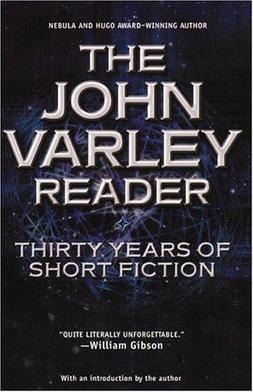
The John Varley Reader is a representative collection of 18 of the science fiction short stories by John Varley, first published in paperback in September 2004. It features 5 new stories. Each story is preceded by an autobiographical introduction; until this book Varley had avoided discussing himself, or his works, in print.

The Hayakawa's S-F Magazine Reader's Award is an annual poll conducted by Hayakawa's S-F Magazine for the best Japanese short story, illustrator, and foreign short story, voted by the readers from their issues in the previous year. The honor has been awarded since 1989.
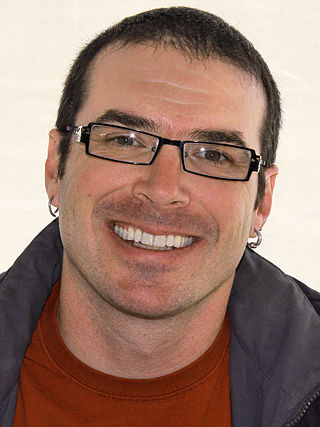
Paolo Tadini Bacigalupi is an American science fiction and fantasy writer. He has won the Hugo, Nebula, John W. Campbell Memorial, Compton Crook, Theodore Sturgeon, and Michael L. Printz awards, and has been nominated for the National Book Award. His fiction has appeared in The Magazine of Fantasy & Science Fiction, Asimov's Science Fiction, and the environmental journal High Country News. Nonfiction essays of his have appeared in Salon.com and High Country News, and have been syndicated in newspapers, including the Idaho Statesman, the Albuquerque Journal, and The Salt Lake Tribune.
The 57th World Science Fiction Convention (Worldcon), also known as Aussiecon Three, was held on 2–6 September 1999 at the Melbourne Convention and Exhibition Centre in Melbourne, Australia.
"Wang's Carpets" is a science-fiction short story by Australian writer Greg Egan, first published in New Legends edited by Greg Bear and Martin H. Greenberg on 5 April 1995.
"The Planck Dive" is a science fiction novelette by Australian writer Greg Egan, published in 1998.
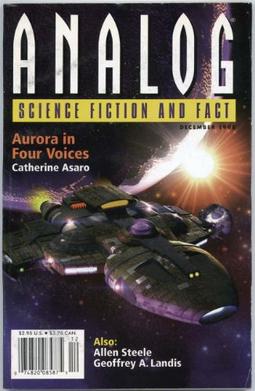
"Aurora in Four Voices" is a short science fiction novella written by Catherine Asaro and published in December 1998. It is part of the Skolian Empire series and was originally published in Analog Science Fiction and Fact. It was also available free online at Analog magazine's website.
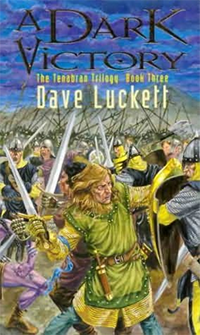
A Dark Victory is a 1999 young adult fantasy novel by Dave Luckett and is the last book in the Tenabran Trilogy. It follows the story of how Will is preparing for his final battle as Prince Nathan's armies mass on the moors.

Dreaming Down-Under is a 1998 speculative fiction anthology edited by Jack Dann and Janeen Webb.
"The Diamond Pit" is a 2001 fantasy science fiction novella by American writer Jack Dann.
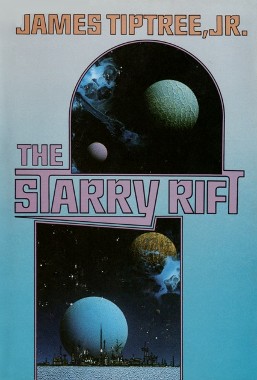
The Starry Rift is a linked science fiction short story collection by James Tiptree, Jr first published in 1986 by Tor Books. It takes place in the same universe as several other works by Tiptree, most notably her 1985 novel Brightness Falls from the Air.
"Press Enter", often stylized PRESS ENTER ■, is a science fiction novella by American writer John Varley originally published in the May 1984 issue of Isaac Asimov's Science Fiction Magazine. In 1985 it won the Locus Award for Best Novella, Hugo Award for Best Novella and Nebula Award for Best Novella.
Dark Integers and Other Stories is a collection of five science-fiction short stories by Australian writer Greg Egan, published on 25 March 2008 by Subterranean Press. One of them, "Oceanic", won the Hugo Award for Best Novella, while two others were nominated.
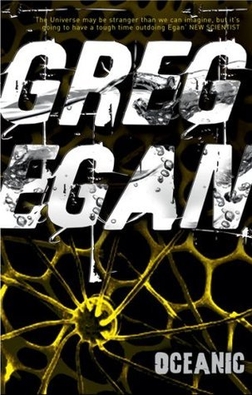
Oceanic is a collection of 12 science fiction short stories by Australian writer Greg Egan, published on 16 July 2009 by Gollancz.
"Luminous" is a science-fiction short story by Australian writer Greg Egan, first published in Asimov’s Science Fiction in September 1995.
"Dark Integers" is a science-fiction short story by Australian writer Greg Egan, first published in Asimov's Science Fiction in October/November 2007. The short story was included in the collections Dark Integers and Other Stories in 2008, Oceanic in 2009 and The Best of Greg Egan in 2020. It was nominated for the Hugo Award for Best Novelette in 2008. It is a sequel to the short story "Luminous".
"Crystal Nights" is a science-fiction short story by Australian writer Greg Egan, first published in Interzone 215 in April 2008.
Instantiation is a collection of eleven science-fiction short stories by Australian writer Greg Egan, published in 2020.
Sleep and the Soul is a collection of ten science-fiction short stories by Australian writer Greg Egan, published in 2023.









